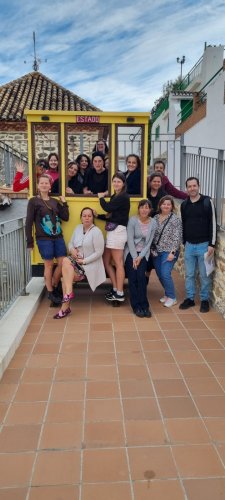
Second chances
When our activist Linda was invited to the Salto Inclusion and Diversity Forum in Romania this spring, we didn't know it would lead to great new international colleagues and promising, meaningful future opportunities. At the Forum, Linda spoke about the solidarity project created by young people in Liepaja Prison, the impact of non-formal education on young people in prison, and the importance of volunteering. After this story, a Spanish youth worker approached her and told her that his organisation "Las Niñas del Tul" in Granada also works with young people in prison. During this conversation they realised that both organisations had something to learn from each other and that there were certainly other associations in Europe that would be interested in this topic. This is how the idea of an exchange trip to Spain was born, thanks to the Erasmus+ programme, already in autumn. The event was called "Second Chances" and we invited representatives of the association "Bona Fide", the South Kurzeme Adult Education Centre and the Probation Service. In Spain we met youth workers, psychologists and psychology students, therapists, mentors, youth workers and project managers from Estonia, Croatia, Turkey, Italy and Spain. We shared our experiences on how to work with young people in prison and probation in each country, what support the non-governmental sector offers, what our needs are and how we could strengthen our work with this challenging target group. The following are reflections from the participants.
"Participation in the Second Chances project gave us the opportunity not only to get to know organisations from other countries, to establish new contacts for future projects and to improve the lives of young people, but also to find new ideas and increase our confidence that the work we do for young people is very, very necessary not only in our country and society, but also in other countries. It was a very unifying feeling - each organisation/institution using different methods and approaches is working with young people at social and criminogenic risk with the aim to make the lives of adolescents and young people better, to show the possibilities and more, and they are doing it with passion and genuine desire. There was a feeling that when organisations like this come together, great things can be done. It was an opportunity to learn more about Erasmus+ and other programmes, to get to know each other and together to create visions for future projects. During the project I gained new practical methods for working with people, as all the participants were enthusiastic and willing to share knowledge, methods and skills, and I visited one of the Spanish prisons (Granada), where I had the opportunity to meet and discuss with a group of young people in prison, finding out their possibilities and wishes for resocialisation, as well as getting to know the culture and conditions of a Spanish prison. Second Chances brought together different countries and showed different realities, opportunities and needs, and gave confidence for the future that we can do better and friendlier and more powerful - each in our own country and together.
The project also gave confidence that such transnational meetings are necessary and important, so I hope that in the future representatives from Latvia will have more and more opportunities and willingness to participate or organise them. Moreover, one of the conclusions that emerged from the project is that NGOs and public authorities need to work together more to understand each other's work and to build successful cooperation with really meaningful and complementary activities, especially in the penal enforcement system. Working with young people at risk is not easy in any country, it is full of challenges, but when organisations and institutions cooperate with each other, results are possible, because I know that joint efforts pay off, and by helping young people, we build our future, a happier society.
Participating in Erasmus+ projects and other activities can be challenging, but more than anything, it has many benefits - exchange of experience, ideas, knowledge, new partners (friends) and opportunities to create and develop ideas together to make lives better. After taking part in the project, I also have a lot of reflections, ideas and questions - how to do, how to develop and improve penitentiary work according to the possibilities and the real needs of young people in our country? Young person. System. Law. Opportunities. The Different. Future. Faith. Courage. Ideas. Team. These are just some of the keywords that describe the Second Chances project and the time spent with the participants.
Thank you to Radi Vidi Pats and my workplace - the National Probation Service - for the opportunity to experience a wonderful and meaningful international encounter."
Iveta, Probation Service
Currently, new projects are being planned, and the needs of prison and probation staff, as well as young people in prison, are being explored. We very much hope that next year we will be able to share the good news of new activities that will improve young people's opportunities and confidence to return to society more prepared, healthier, ready to give and create.
The mobility of youthworkers “Second Chances” is financed by the Erasmus+ Programme of the European Union.
This publication reflects only the viewpoint of the author.